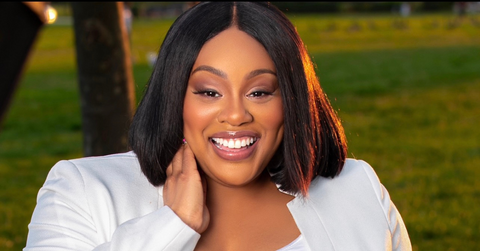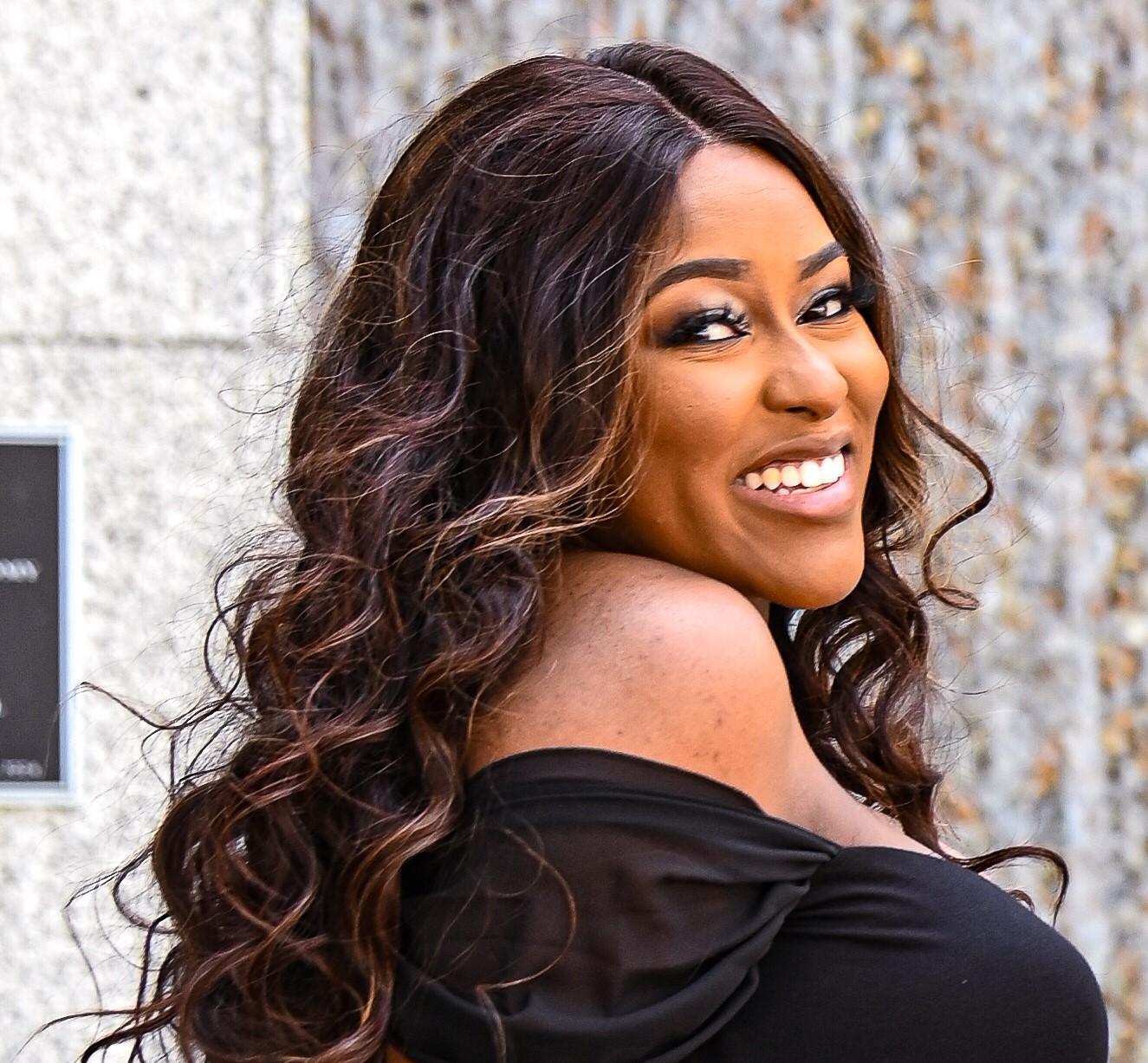“Doing it big” is a colloquial phrase often used to describe actions or behaviors that are grand, impressive, or done on a large scale. By that definition, Akira Armstrong does it big as the founder and CEO of Pretty BIG Movement, the first international full-figured dance company based in New York City.
Akira is a trailblazing Bronx native with skills that have taken her resume to the next level with credits including performing alongside artists like Beyoncé, Janet Jackson, Lizzo, Salt-N-PEPA, SWV, Jennifer Hudson, Jasmine Sullivan, Daddy Yankee, Big Freedia, television performances on Lip Sync Battle, Black Girls Rock, and the 2019 MTV VMAs, and even a stint on Netflix’s Dance 100 dance competition show.
While moving her feet to the beat is a passion, Akira’s purpose is bigger. Akira has made an impact beyond visibility. Her purpose is to encourage body positivity and inclusion through her love of teaching and choreographing. From her middle school students to her apprenticeship intensive dance training program geared to cultivate non-professional full-figured and plus-sized women and men to prepare for mainstream media platforms, Akira has created a no-judgment zone and safe space for women and men of all sizes to embrace their love of dance.
In early January 2022, a monumental announcement showed that after 15 years of work, Akira had arrived. Tina Mabry, writer, director, and producer with credits from Queen Sugar, Queen of the South and Pose, signed on with Warner Bros. for HBO Max and John Legend’s Get Lifted Film Company along with MACRO to tell Akira’s story. It’s the story of rising over rejection in Hollywood to build a dance company that would defy stereotypes for years to come.
Ahead of Akira’s shift to focus on her movie and next steps with Pretty BIG movement, Her Agenda spoke with her about motivation, momentum, and motherhood in her nearly two-decade career.
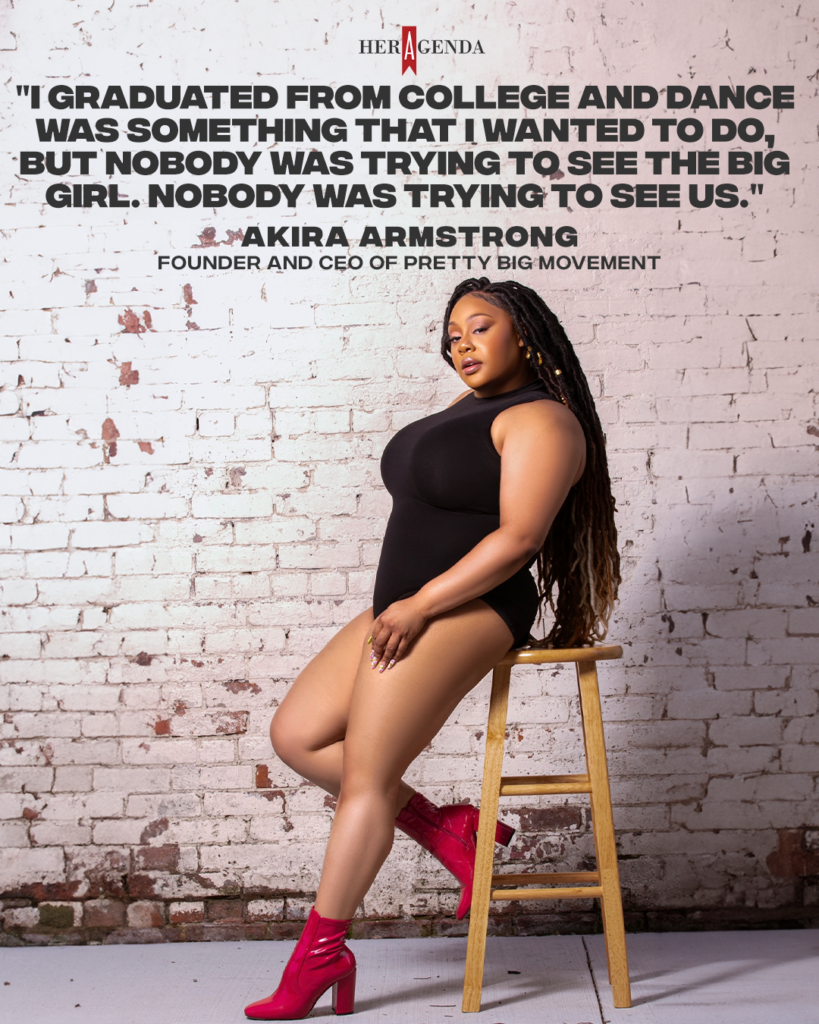
Her Agenda: I know you are from the Bronx. How do you think growing up in the Bronx influenced your journey?
Akira Armstrong: First and foremost, my style and how I dress is very Bronx ‘90s chick, even at the age that I’m at. Growing up, my mom was very influential in how me and my brother presented ourselves so that plays a huge part in my personality. And it plays a huge part in my company, Pretty BIG Movement. I’m colorful every day. Even at this big age that I’m at, it’s always going to be color. I was [also] impacted by music. Of course, ‘90s hip hop and ‘90s R&B play a huge part in my aesthetic and how I style who I am.
Her Agenda: There was no shortage of information to find about all the stuff that you did. Of course, the thing that probably stands out the most is working with “the” Beyoncé. Talk about what your experience was like working with Beyoncé, not once but a few times.
Akira Armstrong: I’ve only worked with her twice, back in 2007. I’m going to say the year, because it’s important that I mention a year because in 2007 plus size women weren’t really being recognized. I auditioned for [Beyoncé’s] world tour at City Center in New York City and unfortunately, I didn’t get the opportunity to be on her tour, but I did get the opportunity to be in two music videos at the time when [Beyoncé] was creating the project B’Day. The album where she did like seven videos in one week.
So I was a part of that history, and working with her, I noticed that she never complained. She’s a hard worker. She literally sat in rehearsal for like 16 hours and never got up to use the bathroom. ‘It was like, does she even go to the bathroom?’ She’s just so tuned in and so locked into what she’s doing. I respect [Beyoncé] as an artist because she’s so locked in and she wants to see every part. We had to wear heels in rehearsal. Nobody could wear [just] socks and sneakers. I even recall losing like 10 pounds that week because we were in rigorous rehearsals for this project that she wanted to put out.
Overall, I respect [Beyoncé] as an artist and what she brings to the commercial world. What she exemplifies and what she exuded in rehearsal was there’s no complaining. You work hard, you get the job done and you stay consistent. And that’s how you see results.
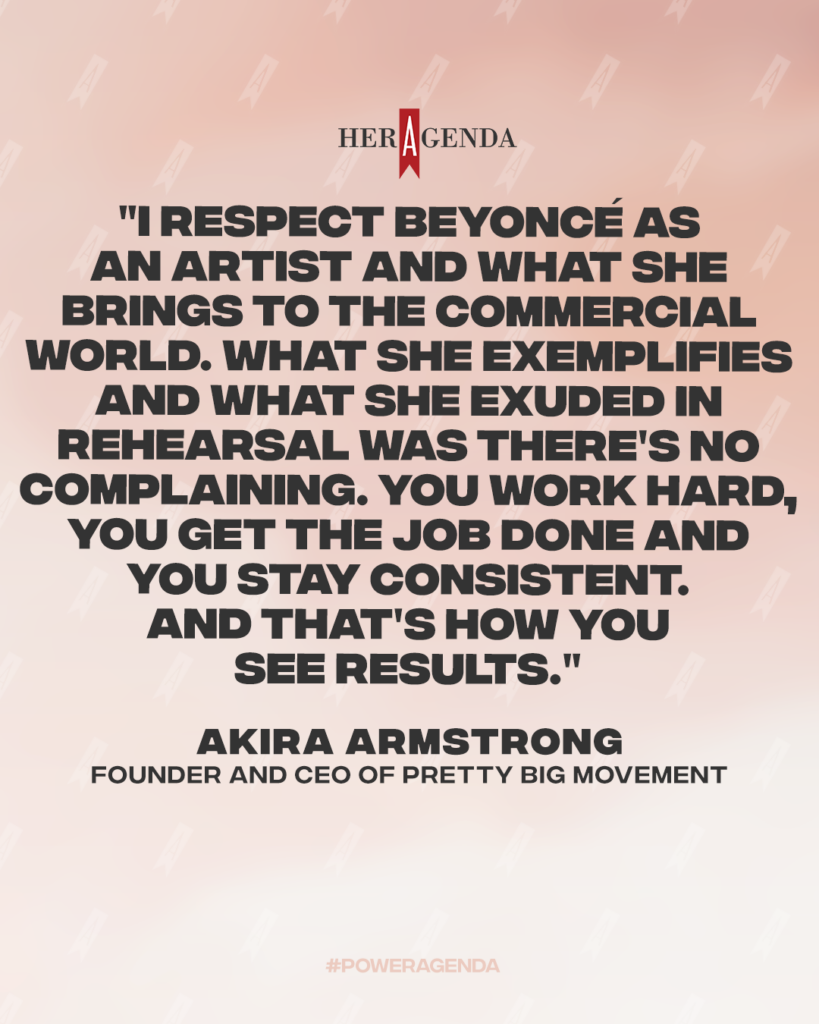
Her Agenda: I love it. I love it. So of course, one of the things that stands out about your work is how you’ve worked to reshape beauty standards in the entertainment industry. The reason I want to ask you a question about this is because there is not a big push for you in your work to lose weight or any of that kind of stuff. It’s all about dancing and having fun. What is it that made you want to really focus in on more of the inclusivity and a self-acceptance part rather than losing weight or trying to transform yourself?
Akira Armstrong: Initially when I came up with Pretty BIG, it was because I was being rejected. I wanted to get representation, so I thought to myself, I know [there] has to be other plus-size women out here who share the same plight as me who want to be seen, who want to be heard, and who want to be respected for what they do as an artist.
When I left LA after the Beyoncé videos, I had to figure out what I wanted to do. I graduated from college and dance was something that I wanted to do, but nobody was trying to see the big girl. Nobody was trying to see us.
I took some time off and I got into makeup and I started working with Salt-N-Pepa as a makeup artist for about three years, as their personal makeup artist. But within that, I still kept true to who I was and wanted to prevail with Pretty BIG movement. I did this gig for Full Figured Fashion Week with a couple of girls. I didn’t know who they were, but we all were plus size, and we were all here for the same common goal, so I said, you know, I’m starting this dance company, this is my vision. Would you like to be a part of it? And they all agreed.
At that time, I think it was maybe six of us. We used to rehearse in 135th Street Hall and YMCA. The reason I made it exclusive to just plus size was because there was no space for us. There was no platform for us. Nobody was giving us the opportunity to dance at award shows or go into the Grammys or none of that was even an inkling in anybody’s mind, in my opinion.
I took it upon myself to create my own lane— plain and simple.
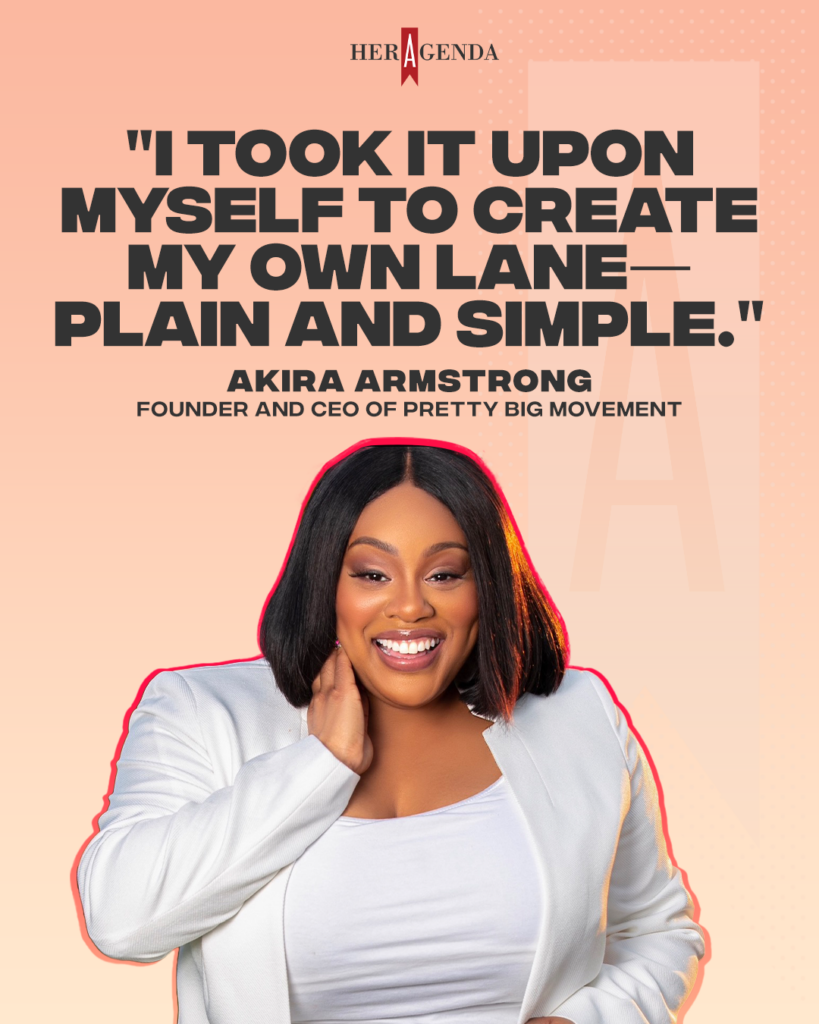
Her Agenda: Obviously it’s worked really well. Something you talked about that I think is really interesting is how you decided to embrace community and say I know I’m not the only person experiencing it. I feel like sometimes that’s a little bit hard for people to do, like to talk to other people about these shared experiences, especially involving rejection. What made you comfortable enough to be able to reach out to someone and share?
Akira Armstrong: What made me comfortable is my confidence because people would expect someone of a certain aesthetic to have low self-esteem.
I didn’t.
I mean, of course, as an adolescent, I dealt with body image issues being a dance major at a professional performing arts high school and things of that nature. But my confidence came from my mom. It came from certain particular women that my mom had in her life that will remind me and reassure me that you’re beautiful, you’re talented. Keep doing what you’re doing. Don’t stop. Don’t give up on your dreams. Just as cliche as those affirmations may sound, it’s very true because it becomes embedded in your spirit and that’s what it did for me. I think my confidence is what kept me in the game.
Her Agenda: That’s a good segue because I know you have danced for a long time. I’m curious how did you keep the passion going when you knew all of these different things were happening? Career setbacks in any form are miserable to anyone so how did you kind of keep that passion? Outside of confidence, was there anything else where you feel like you just had to lean into that to keep going?
Akira Armstrong: My mom got sick in 2014. She had a stroke and a brain aneurysm. During this time, Pretty BIG was literally at the height. We were doing America’s Got Talent, and my mom was in the hospital. So I’m on stage dancing and doing what I do and what I love because it’s my passion and I knew that if I was to stop, if anything was to happen to my mom, she would not want me to stop doing what I’m doing, which is dance and performing, which is my passion.
What I will say is that if it wasn’t for dance, I don’t know where I’d be. As an educator, I teach dance. I teach at a charter school during the day and then I run my business. Everything is dance for me. No matter what dance has been a part of my life. It’s what I am. It’s what I walk with, what I breathe, what I think about, you know, it’s just dance. It’s just what it is for me.
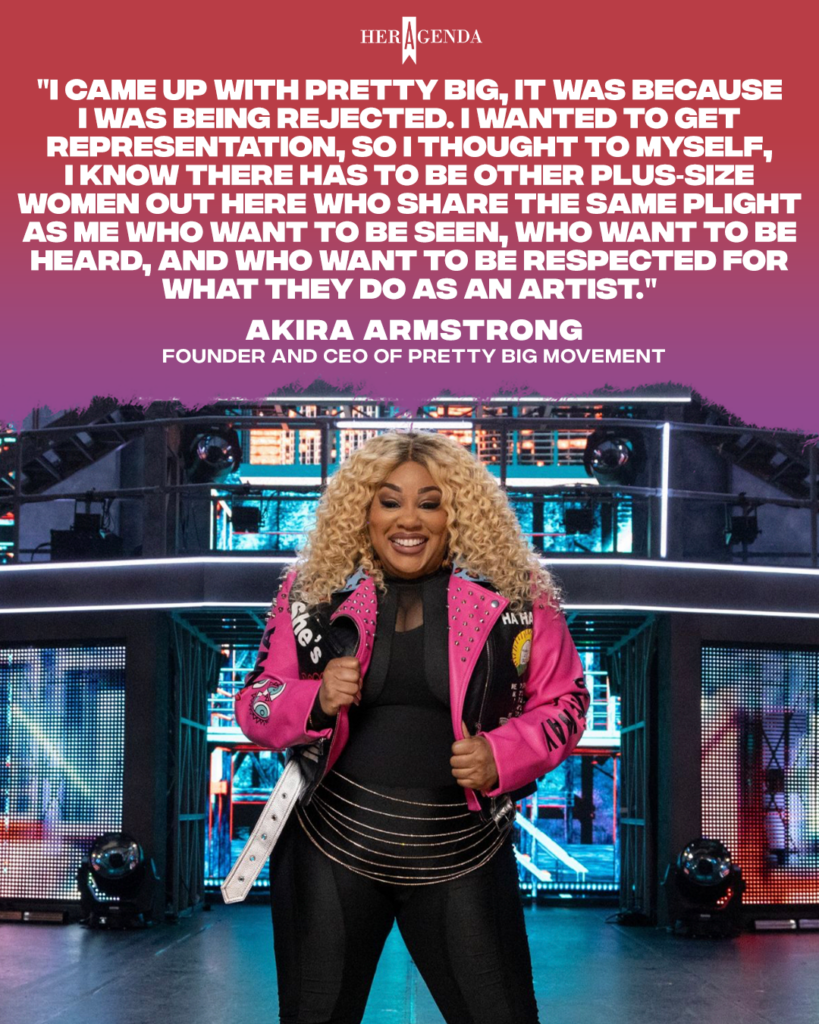
Her Agenda: Talk about teaching. Teaching is always something that people talk about from a very noble perspective. But I also know teaching can be challenging. I’m the daughter of an educator and it can be hard. So talk about your experience teaching and how you keep the mission in harmony with what you do on a day-to-day basis.
Akria Armstrong: Okay, so this is a good question because, in 2023, this generation has the attention span of five seconds. I teach fifth to eighth grade, that’s those ages where they think they know it all. They’re going to try you, they’re trying to find themselves. It’s a whole bunch of things going on at those ages. I use my platform Pretty BIG and the artists and the celebrities that I’ve worked with to kind of reel them in. I think that makes me relatable to my students. Now it’s like, oh, Ms. Kira did this, Ms. Kira did that. [And it also shows them that dance] can be a career. You can take this seriously. Dance is not just an extracurricular activity. This can be something that you can mobilize into your life. Once I get them in, I can teach them. These are things that I had to do to get to that point. You need to do ballet. You need to do modern.
You need to do West African. You need to know your dance terminologies. You need to know your stage directions. [A big part of] teaching the kids is reminding them that it’s not all about the twerking. It’s not all about the glitz and the glamor. It’s a process. It’s a process that you have to go through. I enjoy being an educator. It keeps me on my toes.
Her Agenda: I’m sure kids eat that up because I would eat that up. I was a dancer growing up and I was like, oh my God, you work with Beyoncé? I get it. Something else I think would excite me is the movie. Like, oh my God, you have a whole movie coming out about you.
Akira Armstrong: I think it’s been about three years now [and] we’re still at its beginning stages. The strike put a real damper on where we were going with the project and things of that nature. But it’s still happening. It takes time.
That came about simply because of the work and the consistency that Pretty BIG Movement has been putting in and the power of the internet, the power of going viral and the power of networking, and then the power of meeting people and building relationships with people. That’s how the movie came about. To be transparent with you, it was a bidding war and once it was a bidding war, I said, Akira, you can’t give up on this.
Obviously, not that I’m doubting my brand, but you know, the pandemic shifted a lot for us as creators and what we do in our art. It made some people give up or made some people go harder or [made] some people rethink and revamp their businesses. It uplifted you to either get your [ish] together or gracefully bow out and figure out what the next chapter is in your life. For me, when the movie [opportunity] came around, it came in the middle of the pandemic. And that’s when I was like, Okay God.
I have to keep doing this. So we went with Warner Brothers and teamed up with John Legend’s production company called Get Lifted and MACRO.
To me was a testament to the work that not only myself, but also the women who have come into the space of Pretty BIG Movement, whether they’re still here or they transitioned and did other things and left the company, it’s a reminder that I have something valuable. It’s something that’s a legacy for my son. It’s a legacy for the little girl who’s home, who’s being bullied at school because of her weight, because of the way she looks. I’m praying that this movie is not only empowering, but it’s impactful to the spirit of the young girl and the young boy who may feel like they’re not good enough to be exactly who they were born to be.
Her Agenda: I think that’s so true. I think we always need more of that. So my next question is about your participation in Netflix’s Dance 100. I’m not a big Netflix girl so when I was reading your experience about this, I felt like it was kind of 50-50. The way I viewed it was partially positive, of course, because of visibility, but it was partially negative because of what happened with the voting. So how do you feel the experience was?
Akira Armstrong: My experience with the Dance 100 Netflix series, I’m gonna be honest. I enjoyed the people I met. The experience was a little challenging in the sense of having to work with teenagers. At the time when the project was presented, I was in my thirties but I just felt like I had outgrown that season of my life. I enjoyed meeting beautiful people in the UK working with hair and makeup and working with my competitors. Even though we were all competing, the eight choreographers that got chosen to lead the show, we all got along. We all respected each other. They wanted beef, but there was no beef to create amongst us because we all literally, genuinely liked each other.
The issue wasn’t us, the choreographers, the issues were the dancers who were making the final decisions on whether or not as a choreographer, you stay or you go. The concept was okay, but when you’re talking to 19-year-olds and 20-year-olds, they want to be fed in a different way, they’re not going to understand my process of how I go about choreography, the development of my choreography, the vision that I have. Some people just don’t understand the vision or understand you as a choreographer.
I think that’s why I was eliminated first, which I already knew I was going to be eliminated because number one, just in terms of age [and] process of developing choreography. Like I said, they didn’t get it.
Overall, I’m glad I did it because it pushed me. It really pushed me and my artistry to another level. Will I do it again? No, but I’m glad I did do it because I learned a lot about myself.
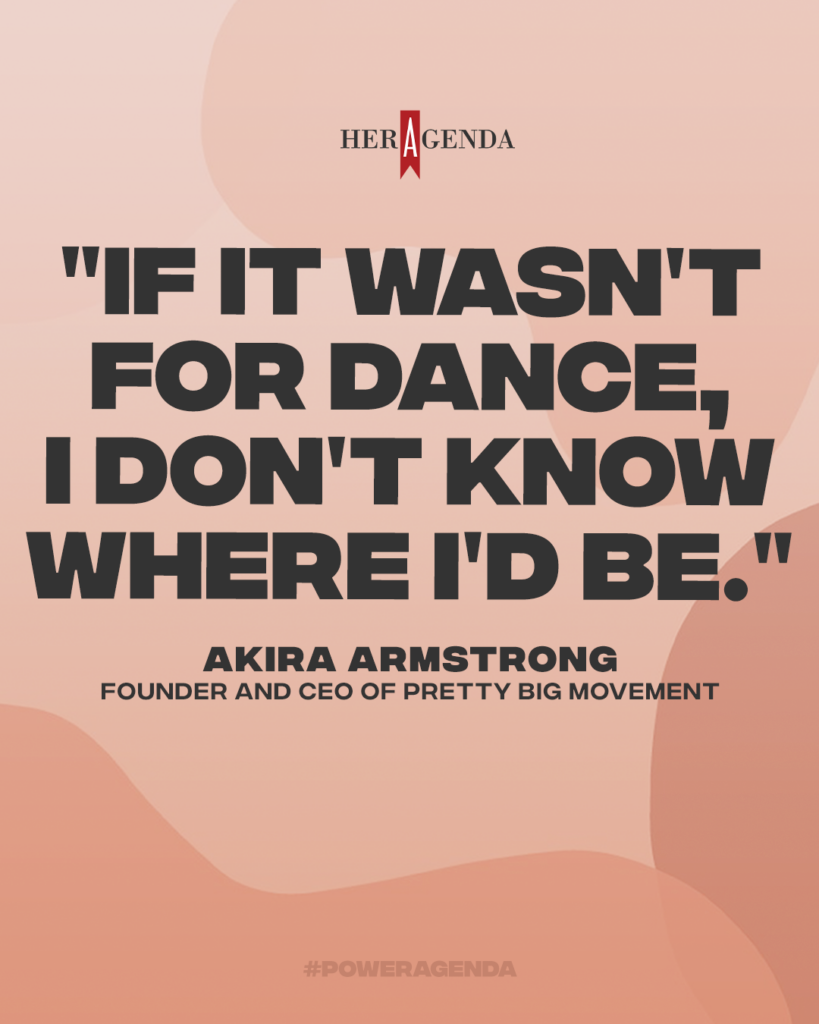
Her Agenda: So my last two questions are more about you and development. So the first one, which is so funny, you have your baby on camera with you, but it’s about being a mom. I’m a newer mom and when I talk to people that are moms, I kind of do this selfishly. I always ask what do you envision your motherhood experience looking like, especially because you are what’s considered a working mom? How do you think you will maintain harmony as a working mom?
Akira Armstrong: Hmm. Whoo. All right. How I maintain harmony as a working mom is by giving myself grace. I am very much a perfectionist in a sense, but I’m unorganized, if that makes sense.
Motherhood and I’m gonna be honest, I just started enjoying motherhood. In the beginning, I went through postpartum. I went through a lot that I did not expect. When you’re a little girl, you’re like, one day I’m going to be a mom and it’s going to be flowers. And it’s like, oh, no, it is not. I think a lot of things people don’t mention, especially as Black women and postpartum within Black women, because it’s very different. I’m not making this a race thing, but it is very different. I struggled a lot in the very beginning.
I had a C-section. And so, that healing process, if you are familiar with it, it’s…if you don’t have your village if you don’t have support, [it’s a challenge] Did I enjoy pregnancy? No. I didn’t like it. I didn’t enjoy pregnancy and people ask me— no, I didn’t enjoy it. Do I love my son dearly? Am I happy that he’s here? Yes. Am I grateful God gave me a boy, not a girl? Yes. Like I wanted a girl so bad, but I got a boy and I love him. Oh, my God. I’m so happy, like I’m enjoying it. I’m understanding what it is now because I didn’t understand it in the beginning. I love it. I love being a mom. The tireless nights. I’m exhausted talking to you now, but I have a supportive partner. His dad is very hands-on so I’m grateful for that.
Her Agenda: The last question is simply — what’s next? I want to precursor this question before you answer because sometimes when you ask people what’s next, it’s almost like prodding them to say the next project or the next thing. I’m just curious, what do you feel like is next for you? What’s next for Akira Armstrong?
Akira Armstrong: Well, of course, I am a mother and will forever be a mom. Raising my son to be the best Black young man that he could possibly be. I want to travel more with him. I want to expose him to things, culture, and as much as I possibly can while I have breath in my body. Pretty BIG Movement is preparing for its first honorary dance showcase, which will be on Saturday, January 27th, 2024. It’s my first time ever putting on a show with the headline of my company, Pretty BIG Movement, so I’m excited and nervous. The only thing that makes me sad is that I’m not partaking in it as a dancer because I just don’t have time to go to rehearsals.
I have great women in positions that have been holding down the company and moving it forward and doing all the things that need to be done for us to have a successful show. Then also relaunching, and revamping my website and launching our e-commerce online Pretty BIG apparel store. Then the movie, getting ready to gear up for that and revisit that project because it’s necessary. And I’m going to keep speaking positively over that project because it needs to happen. That’s pretty much it for me.
[Editor’s note: This interview has been edited for length and clarity.]

